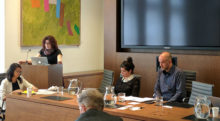In November 2013, a 19-year-old Scottish woman named Aqsa Mahmood left her home in Glasgow and failed to return. Four days after her disappearance, she called her parents from Turkey, as she crossed into Syria on her way to join ISIS. According to her parents, Mahmood was a typical private school teen who showed no signs of harbouring extremist beliefs. So what drove Mahmood and hundreds of other women and girls to flee their homes a join the Islamic State? It’s a question that second-year Master of European and Russian Affairs student Joanna Cotarlea explores in her paper “Twisted Feminism: Motivations behind Western European Female Migration to ISIS.”
“I really wanted to look at the phenomenon of radicalization. I found a lot of research was being done on the radicalization of young men as foreign fighters, but less so on women and the reasons why they become extremists,” says Cotarlea. On January 26, she will present her findings at the 11th Annual Ethnic and Pluralism Studies Graduate Conference (EPSGC).
Hosted by the R. F. Harney Program in Ethnic, Immigration and Pluralism Studies at the Munk School of Global Affairs, the EPSGC brings together graduate students from across the globe to present their research on various aspects of ethnic studies. This year’s presenters are travelling to Toronto from as far away as England and represent a mix of academic disciplines from political science to law to social work.
“What’s particularly interesting about the conference is that there are people from different schools, countries and different areas of study,” says Brittany Witham, a second-year Master of European and Russian Affairs student who will present her paper on healthcare provisions for Indigenous populations in Sweden. “Approaching ethnic and pluralism studies from so many different standpoints allows you to break out of your own private bubble and challenge the way you think about your own research.”
Cotarlea, who is presenting at the conference for a second year, agrees that there is value in the opportunity for student exchange: “The field of ethnic and pluralism studies is so broad. I’ve seen presentations rooted in geography, sociology, education, political science. I think it’s really fascinating to attend the conference and see how many different ways research in ethnic studies can be applied.”
Conference participants also have the opportunity to receive valuable feedback from experts in their field. Each year, a dedicated group of faculty from across Toronto serve as discussants. “In the 11 years of the conference, over 80 faculty from the Munk School, the University of Toronto, and from York and Ryerson Universities, have provided thoughtful critique on each paper submitted,” says Professor Jeffrey Reitz, director of the R.F. Harney Program on Ethnic, Immigration and Pluralism Studies. “Connecting students across disciplines with each other and with top faculty having special expertise in the themes of the papers is a special feature of the conference and represents a unique opportunity for students to improve their work.”
The conference also features a keynote lecture. This year’s speaker is Nancy Foner, distinguished professor of sociology at Hunter College and the Graduate Center of the City University of New York, who will discuss the experiences of Black migrants in Europe and the United States. “The keynote always sets an inspirational tone for the conference,” Reitz says, “and is a highlight creating real excitement and sense of professional engagement.”
Cortalea notes that the conference is important now more than ever as a way to foster greater cultural understanding. “Ethnicity and migration are critical global issues and there are a lot of misconceptions about ethnic groups and why people migrate. Looking at these topics through a scholarly lens allows us to challenge issues like racism, Islamophobia and anti-immigration sentiments in society.”
January 25, 2018
